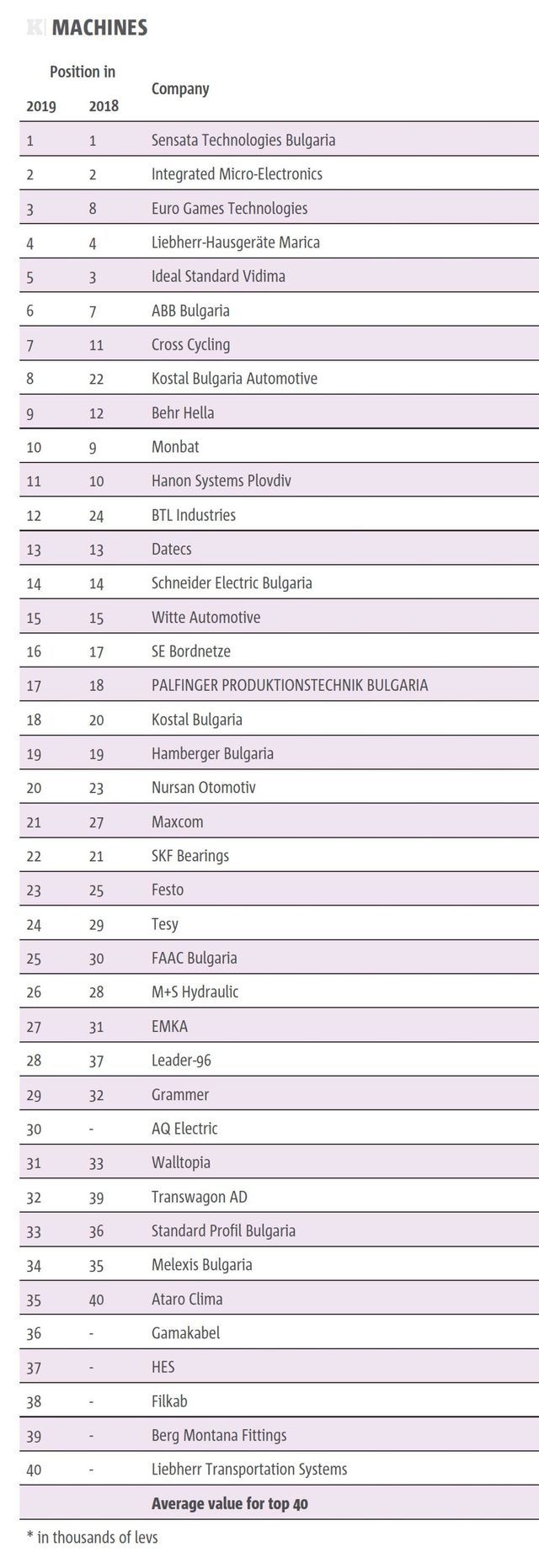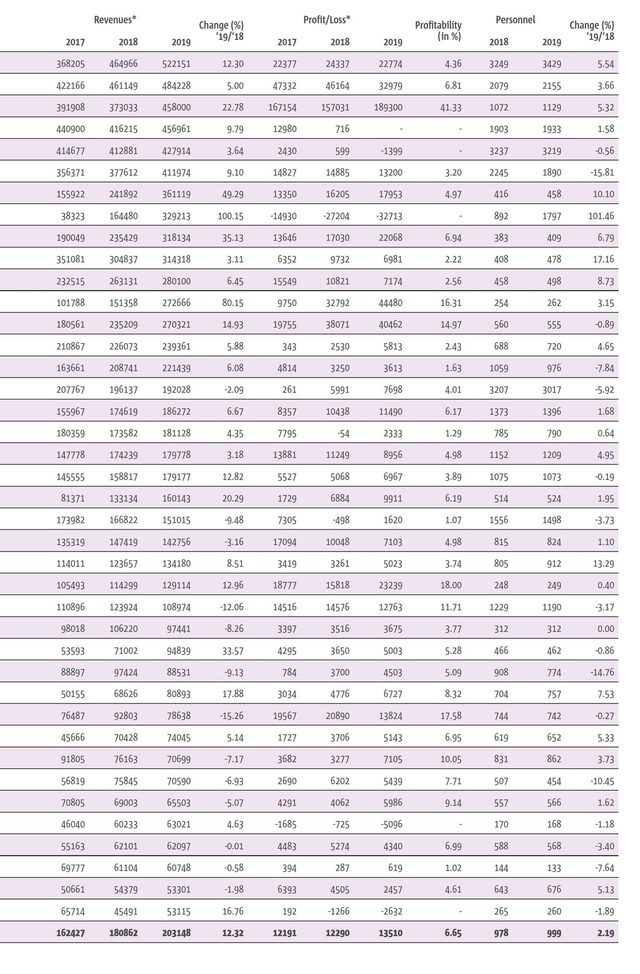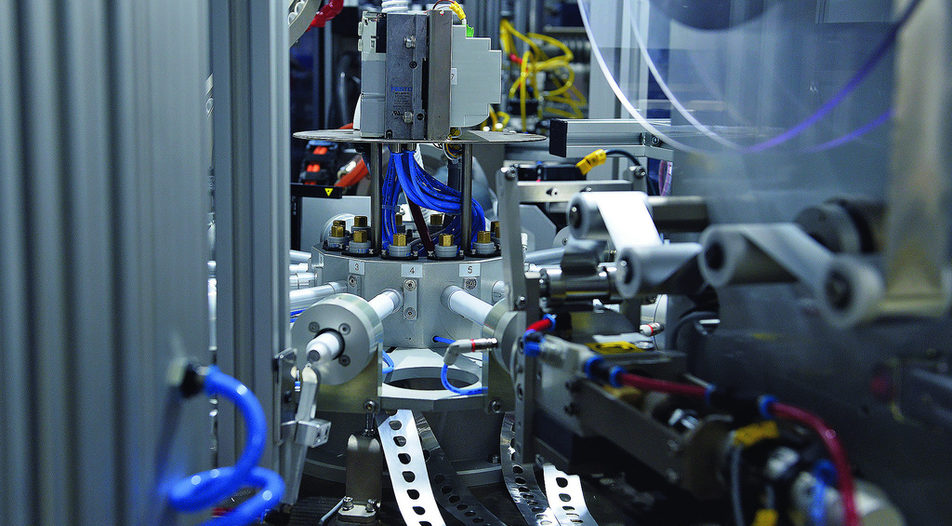Bulgaria's 40 biggest manufacturers of machines and equipment saw their total revenue rise by 12% last year, exceeding 8 billion levs (4.1 billion euro). The figures show that one of the most rapidly growing sectors in recent years has preserved its 2018 growth rate. The gross result would have been even bigger if large manufacturers like Teklas, Yazaki and Montupet had submitted their financial statements in time for the ranking of the The key driver of growth was capacity expansion, as many of the companies won new customers and introduced new products. Nearly half of the top 40 companies manufacture components for the automotive industry, which was booming recently. However, the slowdown in vehicle production last year and the blow that the Covid-19 pandemic delivered on the industry in recent months will most probably be seen in the 2020 results. Evidence of this is the long list of automotive component producers in Bulgaria using the government's 60/40 wage subsidy scheme to keep their employees on the payroll. Most of the companies are reserved in their forecasts; others admit their sales will drop. But there are also winners from the crisis: for another year in a row, bicycle producers report growing demand.
At the top again
After making it to the top of the ranking in 2018, Sensata Technologies Bulgaria preserved its leading position last year, reporting again a double-digit (12.3%) rise in revenue. Thus the company, which is part of U.S.-based Sensata Technologies and has plants in Botevgrad and Plovdiv, as well as a business centre in Sofia, passed beyond the half-a-billion-lev turnover mark. The growth was mainly due to the expansion of manufacturing capabilities, as well as the ramp-up of newly added product groups.
"In Botevgrad, we increased the production volumes and, respectively, sales of our high-temperature sensors used in automobiles. At our Plovdiv plant, we owe the increase to our wide range of control devices for medical, agricultural and heavy vehicles and motorcycles. These lines were transferred from Poland and Germany to Bulgaria in 2017 and represent a diversification of our business alongside the traditional stronghold of sensors for the automotive industry," the company said. The decline in profit resulted from the growth of the business centre in Sofia, where the group is pivoting functions from its worldwide locations.
The economic crisis and shrunken markets resulting from Covid-19 have inevitably taken their toll on the company. "With our strong customer bonds, long-life product designs and a strong base of new business wins we are confident that we will catch up when markets normalize, but we also need to carefully adjust our plans according to the new market reality. We are committed to Bulgaria as a long-term strategic location," Sensata Technologies said.
New plants & equipment
Once an unrivalled leader, Sevlievo-based bathroom product manufacturer Ideal Standard Vidima, part of Ideal Standard International, recedes two positions in the sectoral ranking. Nevertheless, the company has been growing after completing the core part of its three-year investment program of some 62 million levs last year, thus upgrading its sanitary ceramics and fixtures factories. The new equipment and process automation enhanced the plants' capacity and productivity.
Electrical component manufacturer ABB Bulgaria, which is owned by ABB Group, registered a more than 9% hike. "The increase in revenue last year was due to the fact that we opened a new plant in Petrich in September and in addition we finished the refurbishment of our production base in Sevlievo," CEO Marcel van der Hoek said. The investment explains the slight drop in net profit.
Besides the 412 million levs revenue posted by ABB Bulgaria, added to the group's results in this country should be 15.3 million levs revenue of Sevlievo-based ABB Power Grids Bulgaria, which manufactures high-voltage products. In 2019 the enterprise was spun off into a separate company under control of Zurich-based ABB Management Holding in preparation for the sale of ABB Power Grids business to Hitachi.
The international deal was finalized in the middle of 2020 when the Japanese corporation acquired 80.1% of ABB Management Holding (later renamed to Hitachi ABB Power Grids) with an option to acquire ABB's remaining stake in three years. Besides the plant in Sevlievo, ABB has four more production facilities in Bulgaria: two for low and medium-voltage products in the town of Rakovski and now two factories for low-voltage products in Petrich.
The most dynamic
Besides bicycle producers, which have been growing rapidly for a second straight year, several companies displayed much higher results in 2019. The most dynamic one is Kostal Bulgaria Automotive, which doubled its revenue. After joining the sectoral ranking in 22nd spot for the first time in 2018, last year the company climbed to 8th position.
The plant in Pazardzhik manufactures steering column modules and the strong growth was due to production expansion, as the company won new projects from customers and the German Kostal Group transferred production lines from its Czech plant to Pazardzhik. This is Kostal's second plant in Bulgaria. The first one, Smolyan-based Kostal Bulgaria, reported more modest results and ranked 18th. However, this may be its last year in the ranking, as business in Smolyan has shrunk considerably in 2020.
Electronic medical equipment manufacturer BTL Industries, which grew nearly 50% in 2018, booked an 80-plus-per cent increase in revenue in 2019. "The surge last year was due to the strong market growth in Europe, North America and Asia, as well as to the introduction of new machines for aesthetic medicine and rehabilitation," said CEO Georgi Petkov. In 2019, the company started building its own factory in Plovdiv, where it currently rents premises. However, the crisis may delay its plans. "We are still in the process of analyzing and decision-making as to what steps we should take. The Covid-19 crisis considerably affected our operation, as life all over the world changed," Petkov added.
Automotive air-conditioning system manufacturer Behr-Hella Thermocontrol, part of Germany's BHTC, also had another year of growing sales, as revenue in 2019 surged more than 35%. As customer orders increased, the company expanded its plant in Bozhurishte industrial zone near Sofia and the additional capacity was put into operation last year. "Thanks to this we increased our production capacity and were able to take on more contracts," CEO Martin Nyland explained.
With a rise in revenue of nearly 18%, AQ Electric makes its debut in the ranking. The plant in Radomir is owned by Sweden's AQ Group, which also has production facilities in Veliko Tarnovo and Goderch, and manufactures electrical cabinets and components. In 2019 the company invested 6 million euro in a new electrostatic painting line with the idea of attracting new customers from the automotive and train industry. That expansion is the reason for the higher revenue last year.
"The business for the automotive industry is gradually increasing and even making up for other industrial segments that are declining, so that investment was a good decision," CEO Emil Nikolov said. Nevertheless, the company has not been spared the woes of the crisis. "Judging by the orders we received in December, we had to see a 20% increase this year. The latest forecasts, however, are not that optimistic and there may even be a slight decrease. However, the situation is dynamic and I expect it to change in September," he added.
German auto parts made in Bulgaria
Automotive locking system manufacturer Witte Automotive Bulgaria, part of Germany's Witte, has been growing steadily ever since it started production in Ruse 10 years ago and in 2019 it expanded its plant. "In 2019 our revenue increased as a result of the investment in additional capacity," the company said.
After a strong start in the first two months of 2020, however, the coronavirus crisis hit the company's sales, which dropped by a quarter. "What saved us is that we have a customer in China. Nevertheless, sales this year will be lower, for sure," Witte Automotive forecast. In the fall, however, three big production lines will be transferred from Germany, so the Ruse plant expects to reach the planned turnover in early 2021. "On the whole, we predict a slow recovery of the automotive industry over the next four or five years," the company added.
Reduced automotive production and, respectively, investment in the industry is the reason for the slight drop in Festo Production's revenue, as some of the components it is manufacturing are used in car production lines. The company, which is owned by Germany's industrial automation concern Festo, also saw some decline in profit.
"That is partly connected with the smaller turnover and partly with our investments, which, I dare say, can be seen as aggressive given the current situation," CEO Georgi Atanasov said. "We are growing and building actively our Technological and Engineering Center, where we have expenses for personnel and rent. Those investments were started earlier, but they are strategically important for our future and are not influenced by temporary changes in the business situation." Festo's observations show that while some sectors like machine building and automotive are still far from recovering from the crisis, others continue booming.
"There is a steady trend for growth in the food-and-beverage industry, the packaging industry, medlab production and pharmaceuticals, which are well above the volumes we planned," Atanasov said. "The good thing is that the supply chains have fully recovered and we experience no disruptions whatever." Though the company projected a slight decline in revenue at the peak of the pandemic, its latest forecasts show it will reach the result it scored last year or even exceed it slightly.
Riding the high wave
Three of the largest companies in the machine-building sector are bicycle producers: Cross, Maxcom and Leader - 96. They grew at a two-digit pace for the second year in a row in 2019 and climbed the ranking. The reason is the change of focus to the production of electric bikes, which are in a much higher price segment and demand for them is growing in Europe.
"Our growth is due to the change in our portfolio. The share of e-bikes is increasing and we are now assembling higher-class electric versions," Maxcom sales director Nikolay Videnov said. Some 98% of Maxcom's bicycles are assembled for foreign brands like Decathlon and BMC and the main market is Europe.
A changing product mix is a reason for the higher revenue of Leader - 96 too. "We have focused mainly on electric bikes, which have a much higher average price. Our growth is not due to a bigger production volume but to a different type of product," sales director Yordanka Georgieva commented.
Bicycle producers are among the few companies that have not been affected by the crisis and expect to grow further this year. "The crisis had a negligible effect on our business. At the same time, given that consumption has been rising steadily in recent years, we expect a good year," Videnov said. In his words, besides traditionally strong markets like Scandinavia, the Netherlands and Germany, even countries like Italy have started stimulating bike purchases. "Besides, the electric versions have made the use of bicycles much easier and more accessible to everyone," he noted.
Following a slight withdrawal of customers at the beginning of the pandemic, the trend has now changed and Europe is short of bicycles, Leader - 96 points out. "We lost some sales in March and April and therefore we will not be able to achieve the higher growth we projected for this year. Nevertheless, we expect a surge in revenue by 20 - 22% in 2020," Georgieva said.
The desire for individual transportation and the new habits the pandemic has created may turn on the engine that will drive the recovery of the automotive industry and machine-building in general. The crucial condition for that to happen is the recovery of global consumption.


Bulgaria's 40 biggest manufacturers of machines and equipment saw their total revenue rise by 12% last year, exceeding 8 billion levs (4.1 billion euro). The figures show that one of the most rapidly growing sectors in recent years has preserved its 2018 growth rate. The gross result would have been even bigger if large manufacturers like Teklas, Yazaki and Montupet had submitted their financial statements in time for the ranking of the The key driver of growth was capacity expansion, as many of the companies won new customers and introduced new products. Nearly half of the top 40 companies manufacture components for the automotive industry, which was booming recently. However, the slowdown in vehicle production last year and the blow that the Covid-19 pandemic delivered on the industry in recent months will most probably be seen in the 2020 results. Evidence of this is the long list of automotive component producers in Bulgaria using the government's 60/40 wage subsidy scheme to keep their employees on the payroll. Most of the companies are reserved in their forecasts; others admit their sales will drop. But there are also winners from the crisis: for another year in a row, bicycle producers report growing demand.












